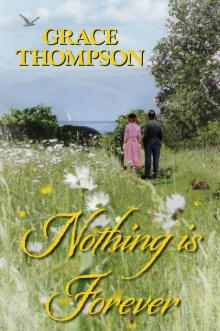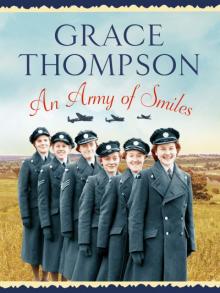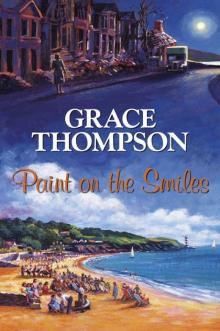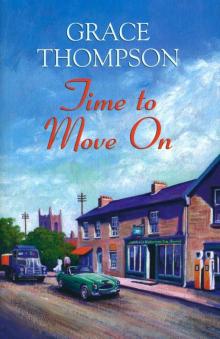- Home
- Grace Thompson
Facing the World Page 4
Facing the World Read online
Page 4
Buying a house wasn’t the end, it was just the beginning. Living in two rooms had meant she had practically no furniture or even kitchen equipment, as she had used that belonging to Mrs Falconer. Even the bare minimum would be costly and she unfolded the statement again, stared at it as though it would magically change for the better, and wondered just how they would cope. Buying everything on hire purchase was a recipe for disaster.
As those thoughts were filling her mind, she saw a notice on the community hall doorway advertising a sale of unwanted furniture. Perhaps, if Mrs Falconer didn’t mind, she might look for a few bargains. After all, it wouldn’t be long before Rhys was home and she would be moving out.
She went to the post office and bought postal orders, which she put in brown business envelopes and sent to Rhys care of a café he regularly used. Surely there wouldn’t be many more payments? His second year would end soon and he wouldn’t need to stay in his digs once the exams were over. He could be here with her and Sadie while he waited for the results. ‘Oh, Rhys,’ she muttered aloud, ‘Please tell me you’re coming home.’
‘Talking to yourself, Sally?’ David Gorse asked, taking the handle of the pushchair from her and talking to Sadie.
Startled, Sally wondered if he had seen her push the postal orders into the brown envelope. She relaxed. Even if he had, he would have been unable to see the name or the address. She was unaware that it wasn’t the first time he had watched her buy the postal orders and had guessed the reason for the regular arrangement.
She approached the gate in School Lane and saw Mrs Falconer at the door. David Gorse helped her lift the pushchair inside.
‘Cup of tea?’ he asked, winking at Mrs Falconer. ‘I’ve got some biscuits, plenty for four of us.’
He sat talking to Sadie while Sally made the tea and Mrs Falconer brought cakes to add to the biscuits. When they had finished and Mrs Falconer had returned to her part of the house, David stared at Sally and said, softly, ‘I do admire you, Sally.’
‘Me? Why?’
‘The way you support Rhys. Oh, I know you pretend not to know where he is, but you send money, don’t you?’
‘It’s none of your business what I do.’
‘Knowing he committed those burglaries, and that the police want him for questioning, you still support him.’ Sally said nothing, and he went on, ‘He’s a lucky man and I just hope he knows it. You deserve so much better than a weak man like Rhys.’
‘Stop this,’ she said and she stood, implying that he should leave, but he stood with her and held her arms.
‘Sally, I know what he’s like. We’ve known each other all our lives and he’s weak. And you can add cowardly to that, sheltering behind a strong and brave woman like you.’
‘Please go, David. And keep your suspicions to yourself, There are enough gossips in Tre Melin without you starting.’
‘Don’t forget I’m here when you need a friend.’
She didn’t reply.
Valmai spent most of the following weekend trying to sort out the contents of her shed. She struggled to get in and push out some of the contents so she could at least see what she had kept all these years, ‘Just in case.’ She dragged everything she could move into a pile and had to climb out of the shed, having thrown it too close to the doorway. Each afternoon she did a little more and on Saturday morning, after struggling for an hour with a tea chest filled with boxes of screws and assorted nails and oddments of metal that she no longer remembered the use of, Netta from next door came out and offered help.
‘No use me asking my Walter to help. It’s as much as he can do to dress and feed himself, lazy so-and-so,’ she muttered. ‘Our Jimmy might enjoy giving a hand, though. Jimmy?’ she shouted and a tousle-headed ten-year-old boy appeared in the doorway, a round of toast in his hand, jam decorating his freckled face.
‘Mornin’, Mrs Martin,’ he called. ‘There’s a mess you’ve made in your garden.’
‘Be’ave,’ Netta scolded, but he grinned, unrepentant.
‘Eric’s coming later,’ Valmai said. ‘He’ll soon tell me what to keep and what to throw away.’
‘All of it, I’d say,’ Netta muttered.
‘Can I have that old toboggan? Your Rhys is too old for it now.’
‘It’s April. You’ll wait a long time for some snow, young Jimmy.’
Jimmy came over, having wiped his sticky fingers on his jumper, and began helping her to sort out the muddle into various piles. There were lots of pieces of wood ranging from large planks and tree branches to small offcuts stored ready for firewood, but now Valmai piled the best of the small oddly shaped pieces, knowing that if she could persuade Gwilym to start making small toys they would be useful.
Eric came as arranged and when most of the contents were spread across the top of the garden he went inside to check on the building itself. He came out and shook his head. ‘Rotten all along the bottom,’ he reported, ‘and the roof could give way if we had a storm.’
‘It can be mended, though?’ Valmai asked.
Again the shake of his head. ‘Sorry, Val, but it’s too far gone and the expense wouldn’t be worth it. It’ll never make a workshop. It’s a bit too small too. You need a new one, I’m afraid.’
‘Tea, anyone?’ Gwilym called from the doorway.
Valmai hid her disappointment and instead said, ‘I’ll go to the timber yard. Sectional sheds are the cheapest, aren’t they?’
‘Not if we get some of the men together and make it ourselves.’ He looked at Gwilym, who was watching from the doorway, sitting in his chair, a blanket covering his legs, waving a tea-cup. ‘You’ll have to design it, mind, Gwilym. Only you know what you’ll need.’
‘Too expensive,’ Gwilym said, turning his chair to go back inside. ‘Nice idea, but there’s no way we can afford a new shed.’ He was half-smiling, as though relieved that his idea had been vetoed by economics.
‘We’ll see about that,’ Valmai muttered. She followed her husband back into the house with Eric and young Jimmy Prosser following. ‘We’ll have a cup of tea while we think about the best way to go about it,’ she announced. She filled the kettle then turned to Gwilym. ‘It’s no use putting on a pout. A new shed you need and that’s what you’ll have.’
When Eric left, having promised to try and get a work team together, Jimmy went with him.
‘Where are you off to, young Jimmy?’ Eric asked.
‘Don’t know. Down through the wood to the old mill, probably. There’s a pair of wrens nesting down there and would you believe a duck has made a nest on the paddles of the waterwheel. Lucky it no longer works, eh?’
‘Be careful down there. That building is in a poor state.’
‘A hundred and fifty years old and still stronger than Gwilym’s shed!’ Jimmy said.
‘True enough,’ Eric agreed with a laugh.
‘Someone’s been sleeping there.’
‘What, recently?’
‘I found some paper and a few crusts, and an apple core, and they weren’t there the day before.’ He put a hand in his pocket and showed Eric a small brass disc that at first looked like a coin. ‘I found this too. What d’you think it is?’
Eric looked at it. It bore a number and the name of a coal mine. ‘When the miners go down to start work they take a disc like this from the foreman and when they come back up they give him the disc back. That way the foreman knows how many men went down and knows that all the men are all safely out.’ He was frowning as he handed it back to Jimmy, who examined it with interest. The mine was the one where Gwilym’s father had worked. He was almost certain that the disk was the one proudly owned by Rhys. Did this mean Rhys had been there? Sleeping at the old mill? If he had then Gwilym and Valmai didn’t know. He was their trusted friend and he would have been told.
‘The new shed is the subject of one-sided discussions in our house,’ Valmai complained to Netta. ‘I’m determined we’ll get one and Gwilym is insisting that we can’t afford it and he isn’t
sure he’d work in it if we did. I point out a solution to every problem he comes up with and I’m talking to myself! Oh, Netta, why is he so defeatist?’
‘Pride. Must be. After all, he was a cross-country runner, he coached the local under elevens rugby team, cricket in the summer. To have to give up all that is bound to have changed the poor man.’
‘The rugby team would still like him to help but he won’t pass through our gate. What do I have to do to make him face the world? He’s done nothing wrong yet he’s acting like a—’
‘A criminal? Like your Rhys but with even less reason? They both faced trouble but dealt with it in opposite ways. Gwilym won’t move and Rhys moved too far! They both gave up. Heard anything from your Rhys?’
Valmai shook her head. ‘There’s a card occasionally, usually from somewhere up north. Blackpool, North Wales, even Scotland.’
‘Walking was his favourite pastime like his father, so perhaps he’s just wandering.’
‘If only he’d come home. The police haven’t anything on him. They wanted to question him but he wasn’t a suspect, yet he ran off before they could interview him. If they’d really wanted to talk to him you can’t tell me they wouldn’t have found him. They aren’t stupid. But,’ she added sadly, ‘perhaps my son is.’
‘There might have been some other reason he chose to leave, nothing to do with the robberies.’ Netta was thinking of Sally, left to face the criticisms and bring up her baby on her own. Nothing had been said, but she’d always believed Rhys was the father of two-year-old Sadie. ‘Good heavens, Valmai, I’ve just realized it’s more than two years since he left.’ Pointedly she added, ‘Little Sadie was two a week or so back. Doesn’t time fly?’
Valmai didn’t reply.
When Netta went inside, Walter said, ‘Still making excuses for that son of theirs, is she? Leaving that girl to cope alone. What sort of a man does that?’
‘Not much better yourself,’ Netta retorted. ‘Leaving me to keep the family fed. Lazy you are, Walter Prosser. Time you got up and shifted yourself. Plenty of work out there for those who want it.’
‘I’ve tried. There’s nothing for me and you know it.’
‘I know nothing of the sort. Idle, useless waste of breath you are.’
The argument went on and young Jimmy approached the house with his heart racing, aware that it could go on for a long time. He covered his ears and ran back along the path and out into the street.
Valmai was setting off for work and she called to him. ‘Go in and have a piece of cake with Gwilym, why don’t you?’
His footsteps slowed. ‘Rowing again, they are,’ he said. ‘I hate it when they row. I’m invisible when they row.’
Valmai went back with him and had a quick word with Gwilym, who asked the boy if he fancied a bit of toast. Jimmy stayed until the shouting had subsided then went home. He picked up a chunk of bread, an apple and some crisps and went back out.
Jimmy spent a lot of time out of the house. He wandered around the fields south of Mill Road and spent a lot of time watching the activities around the stream that had once fed the huge wheel of the watermill. He took bread and an apple from his pocket and ate, throwing the crusts where the ducks would find them. Aimlessly strolling through the fields, he joined the main road not far from the Waterstones’ house, where he sat on the wall and watched as men went in and out with discarded bricks, old and new wood. A few of the men stopped to talk to him, and one gave him a couple of sweets from his pocket.
Amy appeared at the window and she banged on the pane and made movements clearly telling him to go away. Pretending not to understand, he waved back cheerily. The front door opened and she came running out, flapping her arms as though he were a strange animal.
‘Evenin’, Mrs,’ he said, amused by her behaviour and the peculiar headdress she wore. ‘Why are you wearing a net curtain on your head?’
‘Go away, you cheeky boy, and don’t sit on my wall like that.’
‘I wasn’t hurting it!’ he grumbled as he jumped down. He didn’t move far, just a few inches away from the wall, and she continued to shoo him away.
She eventually went inside and Jimmy could hear her complaining to someone. Rick came out and walked towards him, but as Jimmy prepared to run he saw the man was smiling. ‘I was only watching the men,’ he protested.
‘Of course. I understand that. I used to love to watch workmen myself. And the milkman and the postman, and when the gas or water board dug a hole, well, that was something that made me mitch from school once or twice,’ Rick confided.
Jimmy stared at him. His jaw dropped in surprise. ‘You aren’t mad at me?’
‘Don’t worry about Amy. She’s so busy at the moment, dealing with the workmen and arranging our wedding, she gets easily upset. She’ll be fine once we’re settled in.’
‘You hope!’ Jimmy said and hurried off. Perhaps Mum thought the same about my dad once, he thought sadly, as he headed for home.
His father was sitting at the table when he got in, his newspaper spread over the plates and condiments and bread set out for dinner. Walter didn’t look up and Jimmy stood looking at him, trying to assess his mood. Walter wasn’t very prepossessing. Bald, thin and wearing only a sleeveless vest with braces holding up a baggy pair of trousers. He needed a shave, his eyes darted from side to side and his lips moved as he continued to read the newspaper, but he looked calm enough. ‘Want to see my painting, Dad?’ Jimmy asked, fingering the disc he had found at the mill as though it were a talisman.
‘What painting?’ His father’s eyes didn’t leave the paper.
‘I came second in a competition at school last week.’ He ran to his room and took it carefully off the wall and ran back down. ‘See?’ he said, as Walter still didn’t look up. ‘Dad?’
Walter turned his head and glanced at the painting. ‘What’s it supposed to be?’
‘Sheep, in a field with the mill in the distance.’
‘Sheep? Funny sheep, boy. Big as cows they are. Better if they taught you something useful. Waste of time scribbling on paper if you ask me.’ He turned back to his newspaper and Jimmy returned the painting to his room. It didn’t go back on the wall: he stuffed it carelessly in a drawer.
He went next door and asked Gwilym if he’d help him make a wooden car for Sadie.
‘Girls don’t want cars,’ Gwilym said. ‘What about a doll?’
‘’Course they do!’
They made a simple shape and Gwilym carefully carved the wheels and the grille and Jimmy took it and played with Sadie for a while, then reluctantly, he went home. The only good thing about home was food, he decided.
For a week it rained every day and the contents of Valmai’s shed were a gloomy sight. A gusting wind reduced the orderly piles into one confused scatter and Valmai began to wonder if the garden would ever return to normal. The rows of vegetables were lost to sight and the sticks ready for the runner beans were leaning drunkenly. Eric came between showers and promised help once the rain stopped.
Walter next door told them they were wasting their time even thinking about a new shed. He waved an arm towards the scattered oddments. ‘You’ll never have room for another shed. Where will you put that lot? For a start you’ll have to have a bonfire and burn the lot of it, then you’ll have a lot of clearing up, then you’ll need a proper cement base, and where are you going to mix concrete, and then—’
‘Come on, Walter, your tea’s ready,’ Netta shouted, with an expression of frustration on her sharp-featured face. ‘They’ve got everything in hand. There’s nothing Gwilym can’t do when he sets his mind on it.’
‘What d’you mean? Are you saying that I—’ The rest was lost as the door slammed behind them.
Valmai stared at the chaos of her garden. Was Walter right? It did seem an impossible dream. She closed her eyes and imagined the new building with the strong workbench and the tools all set out conveniently, the lathe nearby, and Gwilym sitting on his chair patiently working on the figu
re of a small animal. It would happen. It must be possible. ‘Gwilym,’ she said as she shrugged off her raincoat, ‘I think we need two sheds.’
‘Don’t be daft, love.’
‘All right, one new one but something can be done about the old one, surely? Just for storage. I can’t throw that lot out.’ She gestured at the window where rain was running down and completely blocking the view of the chaos of her treasure. Flower pots, paint tins, picture frames, curtain rails and lasts of many sizes from when her father used to mend shoes. Panes of glass from a long-gone greenhouse. Nails and screws and drills of every imaginable size. ‘I can always find something I need. It’s a muddle to you but I know what’s there and usually how to find it.’
‘Hush now, love, the news is coming on.’
‘Netta and Walter are having a television. They say we can go and watch it when there’s something we’ll enjoy.’
‘No need. The wireless is good enough for us. Besides,’ he added with a smile, ‘I don’t fancy sitting listening to Walter moaning for hours. I don’t know how Netta puts up with him, d’you?’
Valmai could have replied that Netta didn’t know how she managed to live with a man who had given up on everything. But she didn’t.
Eric walked away from the post office with his pension. As usual he had divided it up into two envelopes. One paid his rent for the room, the rest was what he had to manage on for the week. He put the two envelopes in his jacket pocket then set off for a walk. The rain had finally relented and a weak sun was drying the ground, making misty patches in places. He felt the warmth on his back and slipped off his jacket, tucking it carelessly under an arm.

 Nothing is Forever
Nothing is Forever Friends and Secrets
Friends and Secrets An Army of Smiles
An Army of Smiles Sophie Street
Sophie Street Gull Island
Gull Island Facing the World
Facing the World The End of a Journey
The End of a Journey Unlocking the Past
Unlocking the Past Goodbye to Dreams
Goodbye to Dreams The Weston Girls
The Weston Girls Paint on the Smiles
Paint on the Smiles Time to Move On
Time to Move On The Runaway
The Runaway